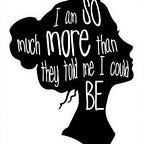Why I Can’t Write Genre Fiction
It all started with a conversation on Goodreads.
A person, whom I took as a fan, messaged me about my novel and asked why I wrote in this genre. Feeling uneasy with the phrasing, I replied: “Because this is what I am reading since my childhood.”
I don’t remember reading anything except mysteries and thrillers — genres much neglected by the authors in my home country, Pakistan. Nobody has ever asked me this question. Why did I write a mystery novel? Or to put it harshly, how dare I write something other than a social message?
The meaning was obvious. You are a writer. You are supposed to reform society. You are supposed to talk about human rights or corrupt government officials. You dare not dream about becoming the next Agatha Christie or James Patterson. Solving murder mysteries is such a first world problem. This is not your domain, miss. And so what if you solve a murder mystery here? There are bigger problems at hand.
I know you are angry, so am I. You must be thinking why is this woman dedicating her life to solve murder mysteries in a country where known killers roam around the streets freely, and judiciary can’t do anything about it. I get your point, my fellow frustrated compatriot.
I agree that there are bigger problems at hand. But, just like there is a task for every tool, there is a story for every writer. I can call myself a fiction writer, and sometimes even that feels like an exaggeration. I am definitely not a rhetorician.
Marriage is a favorite topic in my country. Every drama and every novel revolves around it for some unknowable reason to me. Despite being an active supporter of bachelorhood, I have not convinced my family yet about this matter. What do you expect me to write in this situation? Something about the indistinct future, or something I can relate to because it forms a part of my childhood?
I remember reading “The Crooked House” on a rainy night during my summer vacation. I don’t remember how old I was at that time, but I was young enough to be scared of thundering clouds above my house. My sister was sleeping beside me, who is now married and living far away.
Reading a novel set in a patriarchal British estate was not as foreign to me as some might assume. I am also from a patriarchal family. I was also not allowed to dance, or sing for that matter, in my childhood, just like the young girl in the novel. I can write about that young girl. I can write about her resentment towards her grandfather. But, if you ask me to write about my own story, my very own patriarchal experiences, I would fumble. I would try to hide or run perhaps.
But isn’t it the whole point of stories; to have the cathartic experience of living through someone else?
Stories are my medium to see the world in a particular context. Since my childhood, I look at my problems as a story, preferably of someone else. To all the random bizarre happenings, I give them a beginning. Every issue was a mystery that I had to solve like a detective. Very soon, I started to think about bigger questions in life like why people do what they do. These questions opened the door to other genres of writing like philosophy, psychology, anthropology, etc. From a mere thrill-seeker, I turned into a person who was genuinely curious about the phenomenon of life and beyond life.
We, as citizens of a developing country, are so engrossed in the problem itself that we don’t have time to examine it. We love to look down at writers and artists because they are not “helping” in solving the problem. Who wants art when the US is going to stop the financial aid? We think that the best way to tackle a problem is by mud-slinging. We feel we have done our job by pointing fingers at the ruling government. From mobs burning vehicles to policemen killing the protesters, everything is a fault of the ruling party. We feel happy with our petty explanations because it gives us hope that situation will be different after next election.
Even if I try to be a detective, I doubt that I would ever be able to stop a mob. This apathy need to be answered in a different way. Let me be an individualist. Let me explore the mysteries of a single human being. Human beings, collectively, are depressing.
Let me break it down to the brain function of a single individual: what causes a human being to harm another one without remorse, which ironically brings us back to — oh well — murder mystery.
